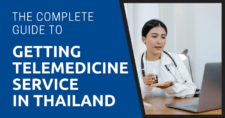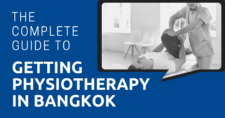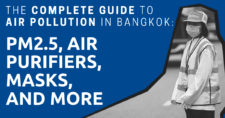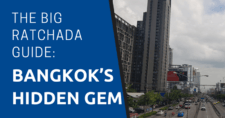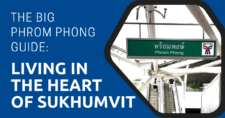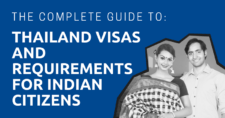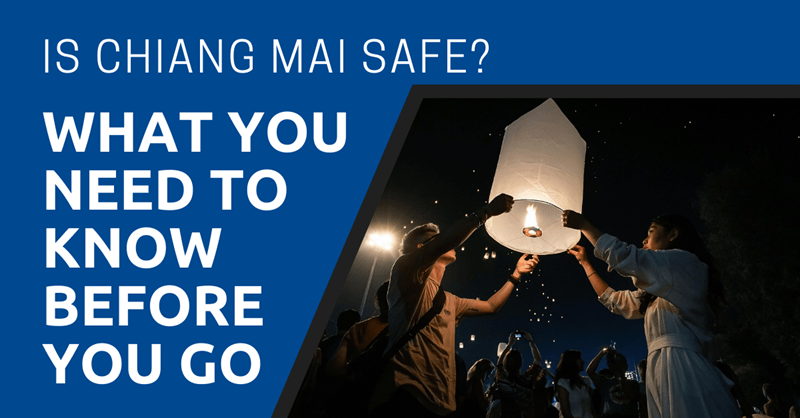
Are you planning to travel to or live in Chiang Mai and wondering how safe the city is?
When I first moved to Chiang Mai, it didn’t take long to notice something: people were kind, the pace was slower than Bangkok, the weather was also nice, and it offered a great combination of city living with hiking just 30 minutes away.
Because of this, I quickly understood why Chiang Mai is a popular destination for digital nomads and retirees.
If you ask me, “Is Chiang Mai safe?” In my experience, yes. I’ve been living here for many years and have never had any serious safety problems. Even late at night, I felt okay walking home alone with a laptop in my backpack.
The biggest safety concern I’ve seen is the seasonal air pollution. Aside from that, I’ve seen a few motorbike accidents and have had to deal with occasional small scams that can be annoying from time to time.
Let me walk you through what I’ve learned about safety in Chiang Mai after living here for many years.
Traveling to Asia? Get peace of mind with LUMA Travel Insurance, offering strong medical coverage up to US$200,000 and full evacuation protection, all for less than US$2 a day. Ideal for trips under six months and perfect for travelers up to 75 years old. Read the full review here. (Advertisement)
"*" indicates required fields
Disclaimer: This article may include links to products or services offered by ExpatDen's partners, which give us commissions when you click on them. Although this may influence how they appear in the text, we only recommend solutions that we would use in your situation. Read more in our Advertising Disclosure.
Contents
(And How It’s Costing Them)
Most expats throw money away, get lost in red tape, and miss the local hacks that make life easier and cheaper. ExpatDen Premium gives you the secrets seasoned expats use to save, earn, and thrive beyond the basics, saving you thousands and opening doors you didn’t even know existed.
Here’s what’s inside:
- Housing Hacks: Slash your rent by 40% or more - because the locals are laughing at what you’re paying.
- Banking Mastery: Stop wasting on fees and get top exchange rates. Why give your money away?
- Healthcare for Local Prices: Quality treatment without the expat price tag.
- Visa and Legal Shortcuts: No more bureaucratic nightmares. Get the visa and residency secrets that others pay their lawyer dearly for.
- Deep Discounts: Find the savings locals rely on for groceries, dining, and more.
If you’re serious about making Thailand work for you, join ExpatDen Premium and make Thailand work for you.
Key Takeaways
- Chiang Mai is generally safe, even at night, and crime involving foreigners is rare.
- Petty theft and motorbike theft do occur, especially in tourist areas
- The biggest health threat is the burning season (Jan–Apr) which brings severe air pollution
- Aside for that, motorbike accidents are the most common safety concern
- Street food is usually safe
- Mosquitoes can be a nuisance during the rainy season
- Flooding can occur in areas near the Ping River and in low-lying sois during the rainy season
- Earthquakes are rare but do happen
- Always use common sense, stay alert in traffic, and consider travel or health insurance for peace of mind
- If you’re a digital nomad living in Chiang Mai, you can get extra protection with Genki Traveler. It’s one of the best value travel medical insurance plans out there, with fees starting at less than US$2 per day. Read our review.
Three Biggest Health Concerns
In my opinion, here are the three biggest safety issues when it comes to living and traveling in Chiang Mai.
Other than that, I’ve found Chiang Mai to be pretty safe. You can find out more about them later in the article.
Burning Season and Air Pollution
This is the biggest health concern in Chiang Mai right now.
From January to April, the air quality can get really bad. Some days, the AQI goes above 250, which basically means “hazardous for health.”
The first year I lived here, I didn’t take it seriously since no one cared much about it at that time. I got a cough that wouldn’t go away, and I thought it was a change of weather.
Now, I know it’s actually from air pollution and take a few precautions. So, I rarely have this symptom anymore.
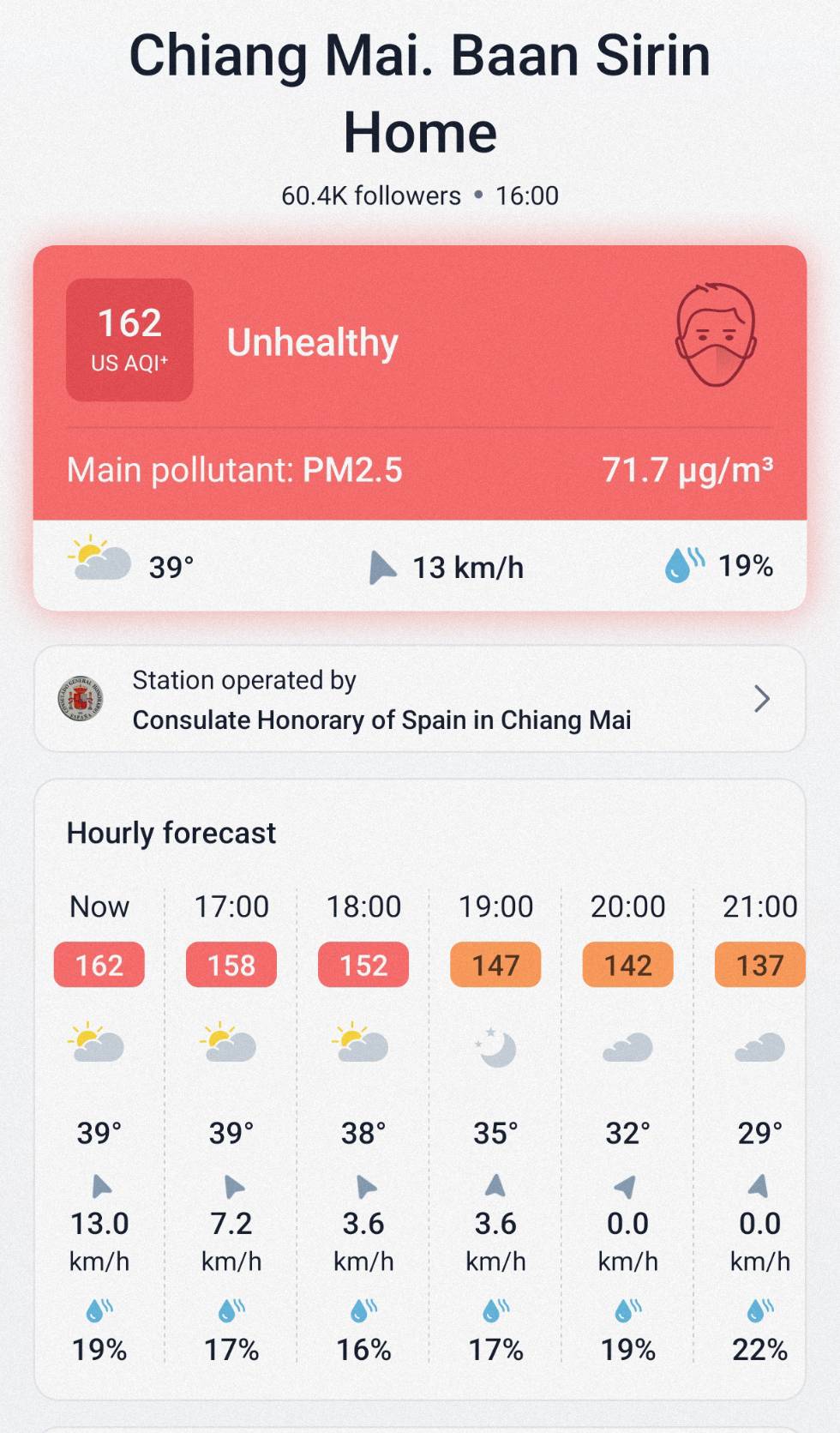
Here’s what I do during the burning season:
- I use the AirVisual app daily to check AQI.
- I use an indoor air quality monitor I bought online.
- I run air purifiers 24/7 (I use Xiaomi models and a DIY setup).
- I wear PM2.5 masks outside. I buy them at pharmacies or order on Lazada.
Air quality the rest of the year is quite good.
Motorbike Accidents
If you ask me what the real safety issue is in Chiang Mai, it’s motorbike accidents. There are two big problems: inexperienced drivers and hilly roads.
I once spoke to a motorbike rental shop owner who told me most damage to his bikes comes from foreign tourists. He rents to locals with minimal inspection, but always takes photos when a foreigner rents.
This lines up with what I’ve seen. In the city, traffic can be heavy during rush hours, and many drivers don’t follow the rules.
The good news is that roads in Chiang Mai are generally in good condition. Outside the city, especially to places like Doi Suthep or Doi Inthanon, the main roads are well-paved but still have sharp curves and steep inclines.
I’ve seen plenty of crashes, especially during the rainy season.
If you want to ride a motorbike in Chiang Mai, here are my personal tips:
- Practice first. I rode around the city to get used to my bike before heading into the hills.
- Stick to main roads. Smaller roads can turn into dirt tracks and are harder to ride on.
- Wear good gear. Always wear a helmet, and if you’re going on a long ride, consider knee and elbow pads.
- Get a Thai license: It’s not hard to do, and your insurance probably won’t cover you without it.
Find out more: How to Get a Motorcycle Driver’s License in Thailand: Documents, Tests, and Renewals
Dealing with the Heat
Another problem I have is the heat during the summertime. From March to May, it gets really hot, often 35–40°C (95–104°F). In addition, since Chiang Mai is in the mountains, the sun feels stronger at this elevation.
Sometimes, I need to dress like Thais do, wearing long-sleeve and UV-protective clothing. During this time of the year, I also avoid going outside during midday and always stay hydrated.
Crime in Chiang Mai
Chiang Mai has a lower crime rate than most major cities in Thailand and performs much better than big cities around the world like New York or London. Safety levels are on par with places like Seoul or Tokyo.
According to Numbeo, it scores around 75 out of 100 on the safety index. It’s considered high by global standards. Here’s what that means:
- You can safely walk alone during the daytime in most parts of the city.
- Even at night, solo female travelers can walk around safely in many areas
Of course, crime can happen. But most people I know, long-term expats and travelers alike, say they’ve never had any real issues. Some even said that they feel safer living in Chiang Mai than their home.
Petty Theft
Petty theft is not common, but it still does happen.
A friend of mine once had her phone taken while she was distracted at a busy night market, but that’s the only firsthand case I’ve heard. Personally, I’ve never had anything stolen, and I’m not especially cautious.
Still, I don’t leave my laptop or valuable items unattended and always stay alert when walking in a busy place like a night market.
Motorbike theft still happens. I’ve never experienced it myself, but I’ve seen it reported in the news from time to time, especially overnight. So, I always make sure my motorbike is locked up well if I’m parking somewhere quiet at night. If I can’t park in a secure lot, I use a heavy-duty lock.
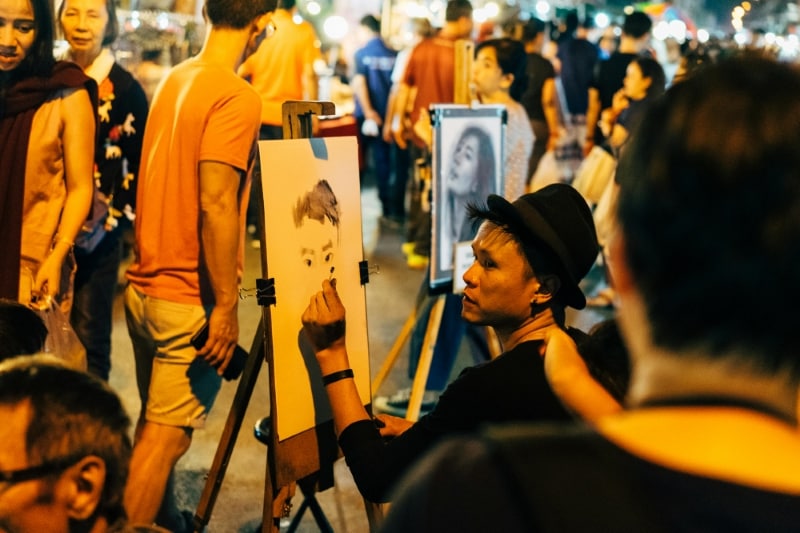
Is the Food Safe?
Chiang Mai’s street food is one of the best parts of living here. I eat at night markets and roadside stalls all the time. So far, I’ve had no serious stomach issues.
In case it’s a dish like Khao Soi, which is served hot, I can eat from any place as long as it looks okay.
However, for certain dishes like “larp” (basically a spicy minced meat salad) or “Sai Ua” (a local Thai sausage with herbs), I only eat from clean and busy stalls.
I also stick to bottled water and don’t use ice unless I trust the place.
Walking Around at Night
In general, it’s safe to walk around at night. I often walk home after working late or grabbing a drink with friends, and I feel fine doing so. That said, I avoid alleys that are too quiet or dark and always stick to the main streets.
Many solo female travelers I’ve met here say they feel safe walking alone too, which says a lot about the city’s safety.
Going Out at Night
Chiang Mai’s nightlife is relaxed. It’s not as extreme as Pattaya. Mainly, it’s about drinking with some chilled music, jazz bars, and lounges. There are also party spots with EDM music.
In my opinion, the nightlife scene here is very safe. I’ve never had an issue, but I’ve seen a few fights—usually caused by someone who’s too drunk or looking for trouble.
Also, if you drink, don’t drive.
Common Scams
Scams happen, sure, but in my experience, they’re usually minor annoyances more than serious threats.
Also, scams in Chiang Mai aren’t as common or aggressive as in bigger tourist hotspots like Bangkok or Phuket. But they do exist.
Red Trucks
The red trucks, or songthaews, are infamous for overpricing. One time, I asked for a ride to the airport. The first driver quoted THB 200. I waved him off, and the next driver offered the same ride for THB 50.
And this doesn’t happen to foreigners only. Thais complain about it too. So unless you speak the local dialect, there’s a high chance you’ll be overcharged by songthaews.
These days, I rarely take a songthaew since I have a motorcycle.
Tip: If you need to take one, always ask the fare before hopping in. If it sounds too high, call a Grab or Bolt. It’s not worth the hassle.
Motorbike Rentals
When I first traveled to Chiang Mai, I rented from many places and realized there are no standards. Some shops inspected the bike with me. Others just handed me the keys.
Now, I always take photos of the bike before riding off and make sure everything is in writing. Most rental places are fine, but it’s still a good idea to be cautious.
Now, whenever I need to rent a motorbike, I check Google Reviews to make sure the shop has a good reputation.
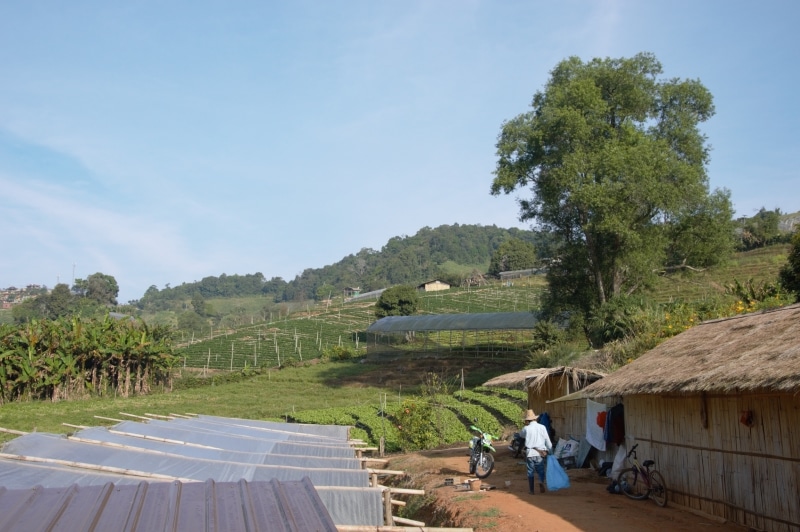
Natural Disasters
Flooding and earthquakes are the two most common natural disasters in Chiang Mai.
Flooding can be common during the rainy season. On the other hand, earthquakes are quite rare.
Flooding
I didn’t think much about flooding when I first moved here. Since Chiang Mai is in the mountains, I thought flooding wouldn’t be an issue. I was wrong.
Areas near the Ping River can flood pretty fast. I’ve also seen parts of Pa Tan and Saraphi struggle with drainage. Even some sois in the Old City or Santitham get temporarily waterlogged.
Tip: Before you rent a place in Chiang Mai, do some research and make sure it’s not prone to flooding. Ask people around the area, not the real estate agent.
Earthquakes
Chiang Mai has the occasional mild earthquake, but they rarely affect daily life. Most of the time, they’re short and harmless.
However, the recent earthquake on March 28, 2025, was the strongest I’ve experienced in Thailand. It was centered in Myanmar but was powerful enough to be felt here.
Several condo buildings developed visible cracks, and some people had to temporarily evacuate their homes.
While events like this are extremely rare in Chiang Mai, it’s something to keep in mind, especially if you plan to stay in a high-rise. It’s worth checking that your condo doesn’t have any structural damage following that quake.
Other Safety Concerns
Mosquitoes and Dengue
Mosquitoes can be annoying but not dangerous.
If you live in the city, like the Old City area, they aren’t much of a problem. But if you’re staying in the hills or near the forest, they can get pretty bad.
Dengue fever, especially during the rainy season (around June to October), is something you need to be cautious of. Sometimes, it is widespread. Fortunately, while I’ve been bitten many times, I’ve never gotten it.
Maybe I’ve been lucky, because I do know people who’ve ended up in the hospital for a few days.
Tip: My trick is to always keep mosquito repellent spray with me. Softfel is my go-to, and it’s easy to find at 7-Eleven. I also have a small jar of ยาหม่อง (a local herbal balm) to treat bites. You can get it from any pharmacy. I also have health insurance. If I do get sick, I want to be able to go to the hospital without worrying about costs.
Snakes
I’ve never had an issue with snakes since I lived in a condo. But if you stay in a house near the forest or in a rural area, it’s something to be aware of.
There’s even a Facebook group called “Snakes of Chiang Mai” that posts daily sightings.
While it’s rare, snakes do sometimes show up in people’s homes. Common ones include Burmese pythons, green pit vipers, rat snakes, and the occasional cobra.
If that happens, you can call a local volunteer team to come remove it, usually within an hour.
Neighborhood-Specific Safety
Here’s what I’ve personally experienced in some of Chiang Mai’s most popular neighborhoods:
- Old City: This is where I lived when I first traveled to Chiang Mai. I love walking around here. It’s very safe, day or night. But in crowded areas, like Tha Pae Walking Street, I keep my bag in front just to be safe.
- Nimmanhaemin (Nimman): This is a digital nomad hotspot and one of the coziest areas in Chiang Mai. I come here regularly to work at co-working spaces, and I’ve never felt unsafe, even walking back from a bar late at night. That said, if you’re planning to live here, be aware that it can get noisy at night, especially near the bar zones.
- Santitham: This area is more local and budget-friendly, with students and young Thais. I’ve lived near here and always felt safe. The only thing to watch out for is that some alleys can be dimly lit, so I stick to the main roads at night.
- Hang Dong / Mae Hia / Doi Saket: These suburban areas are really peaceful. Many retirees rent a house here. However, you’ll need your own transport, and the vibe is quiet and residential. That said, if you’re close to the forest or rice fields, you might spot the occasional snake or have to deal with more insects than in the city. Emergency services also take longer to arrive here, so it’s good to be a bit more self-reliant.
Emergency Contacts
Here’s a list of emergency contacts in Chiang Mai:
Emergency Services
- Police: 191
- Tourist Police: 1155
- Fire Department: 199
- Medical Emergencies: 1669
Hospitals and Clinics
- Chiang Mai Ram Hospital: +66 53 920 300
- Bangkok Hospital Chiang Mai: +66 52 089 888
- Lanna Hospital: +66 53 999 777
Find out more: Emergencies in Thailand: What to Do and Who to Call
Final Thoughts on Safety in Chiang Mai
Living in Chiang Mai feels safe to me. I’ve never had any serious problems. Just the occasional minor annoyance.
That said, I stay alert, especially in traffic or crowded spots like night markets.
If you’re planning a visit or a move here, I recommend getting health or travel insurance. It’s a small price to pay for peace of mind, especially if you plan to ride a motorbike or stay during the burning season. You can use Cigna Healthcare for long-term coverage. You can read our in-depth review here.
In case it’s travel insurance, Safeandnotsorry.com is a great tool to compare plans.And if you’re thinking of staying long-term, check out our in-depth guide to Chiang Mai.


